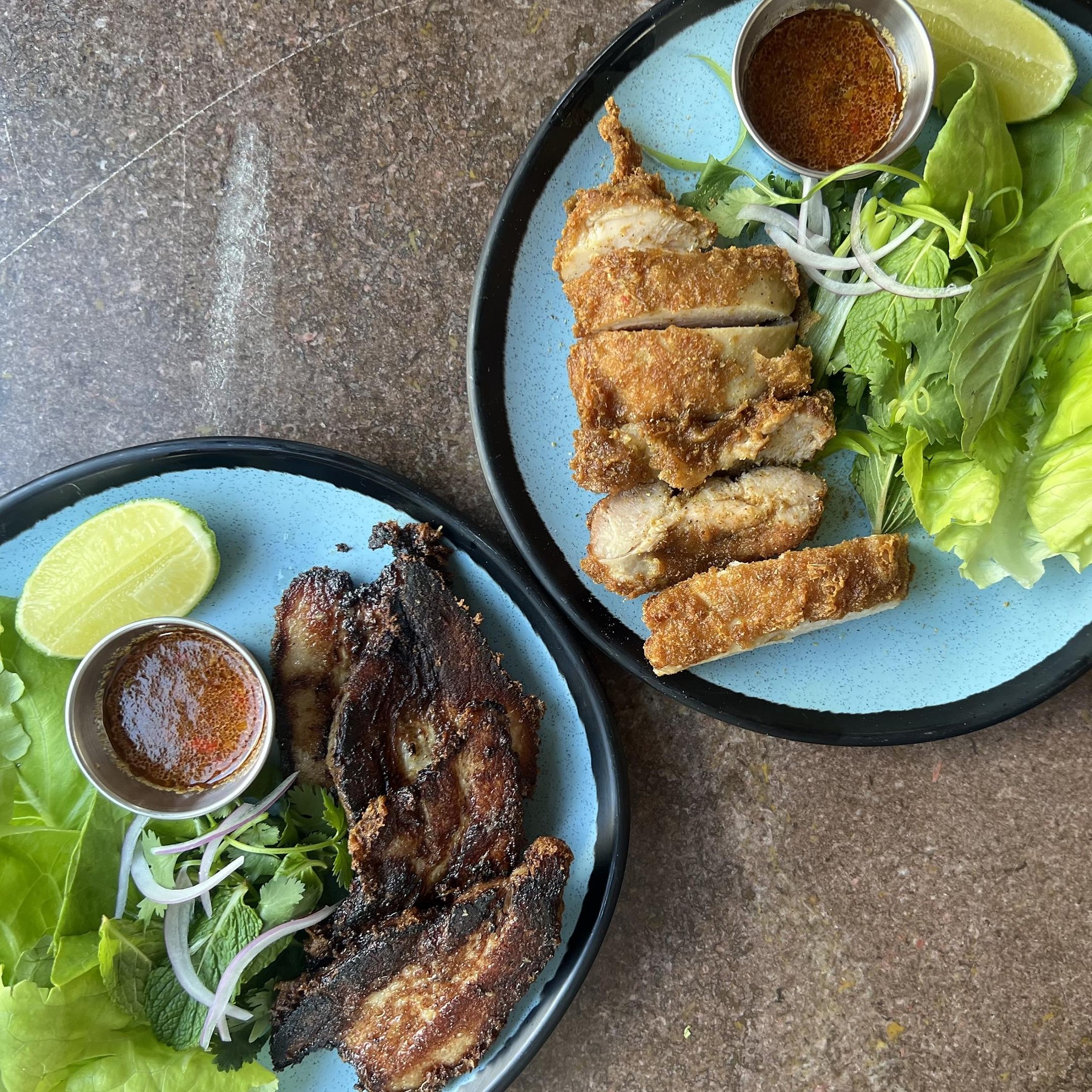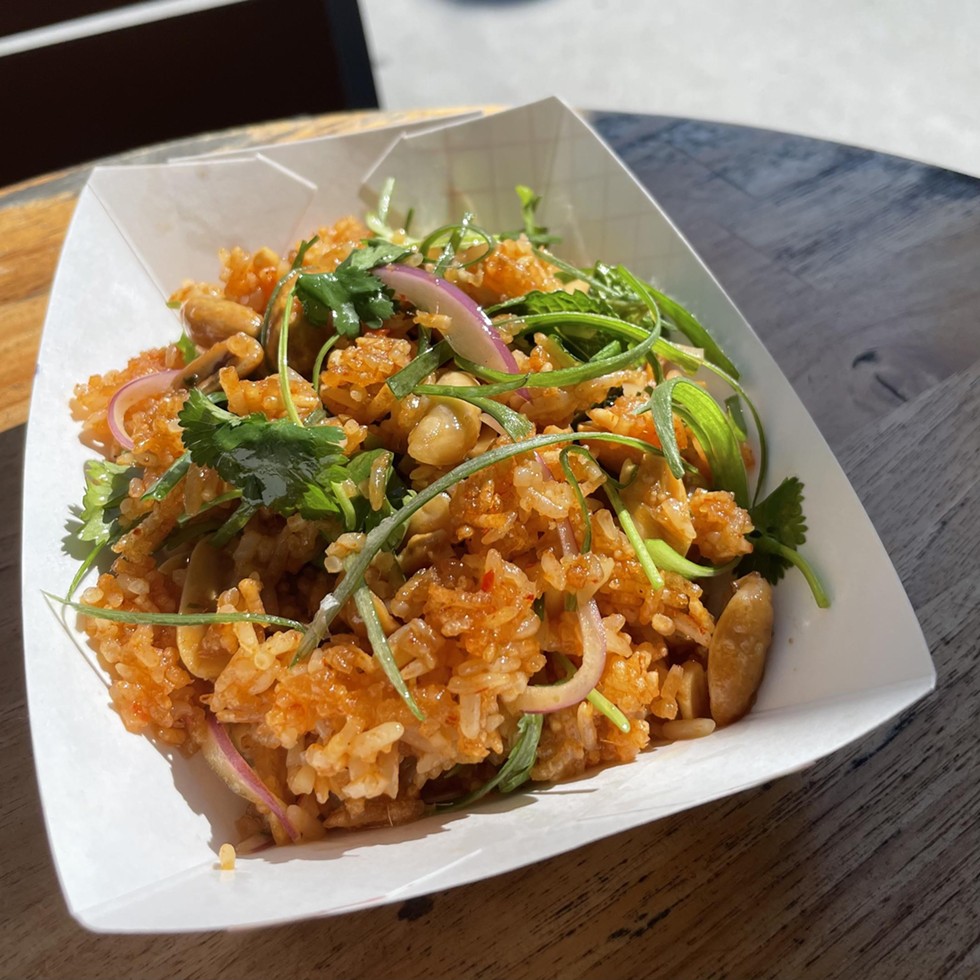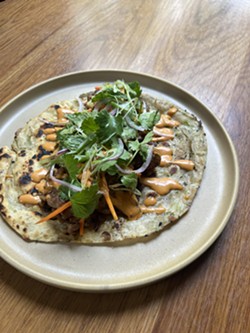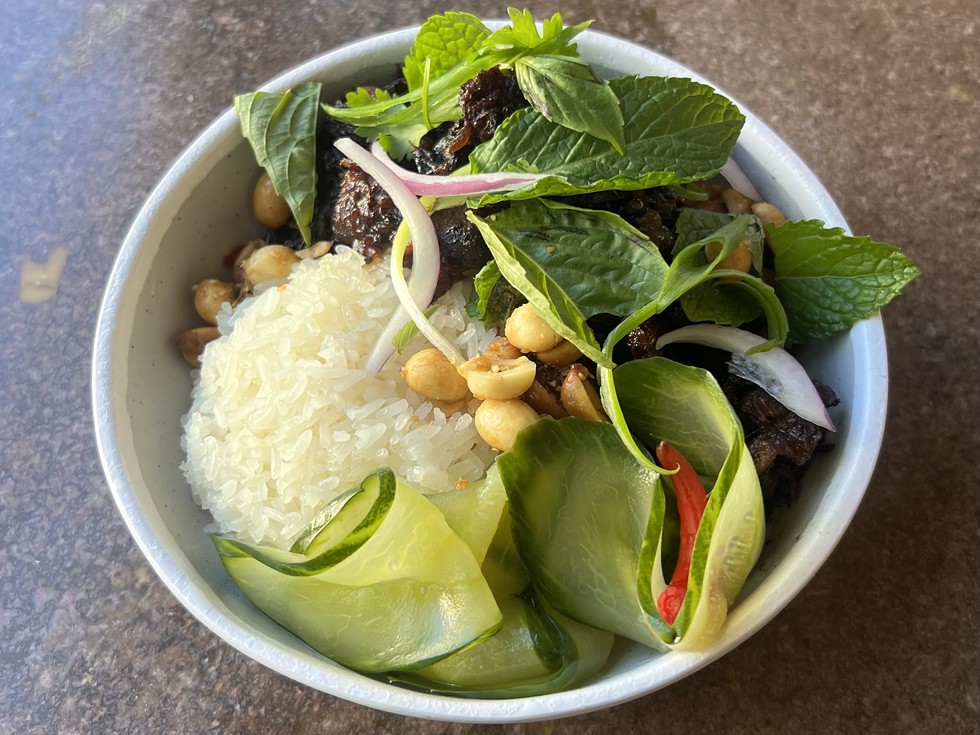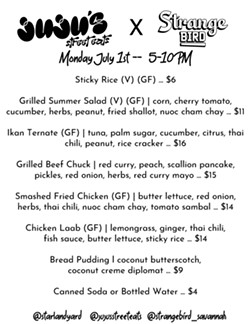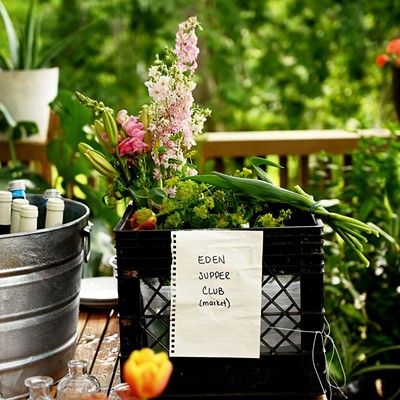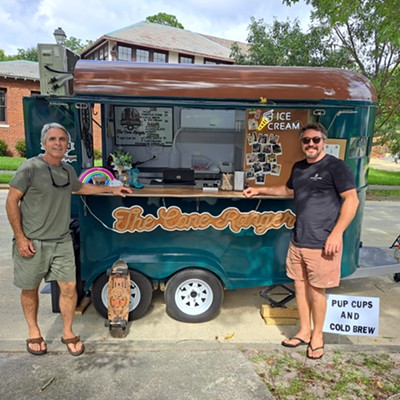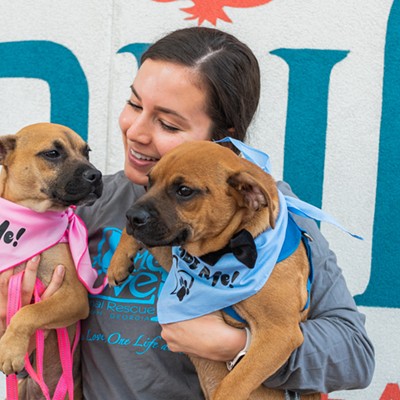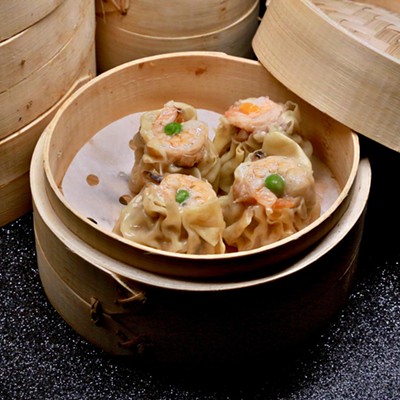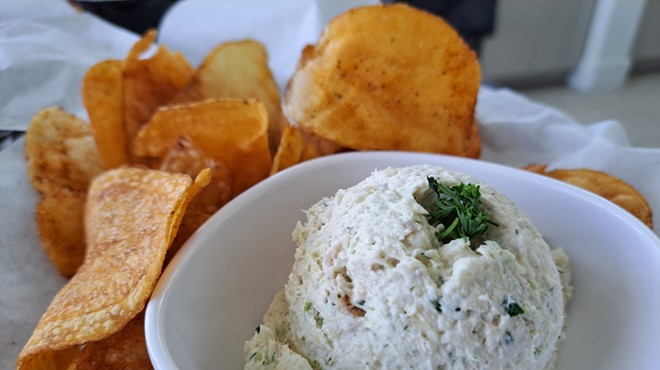In April, Juan Stevenson officially stepped aside as executive chef at Late Air, a position he had held since the Ardsley Park sit-and-sip opened late in 2022. Life changes led him to pursue a major move, and with the help of friends and fellow chefs Brandon Carter and Opie Crooks (FARM Hospitality Group), Stevenson landed a savory executive sous chef spot at Keswick Hall in Charlottesville, Virginia.
Stevenson flew up for a three-day interview and stay at the five-star resort and came back to Savannah all but assured of jumping at the chance. He had not yet accepted what he called “a high-end fine-dining corporate position” but was literally hours away from making that call.
Under the eponymous Juju’s Street Eats moniker, he cheffed two pop-ups—at Strange Bird on March 12 and at Sobremesa on April 22—and consciously said ‘so long’ to Savannah, his home since 2013 when he came to town to study sound design at SCAD.
“I called it my last ditch effort of self-expression,” Stevenson said self-effacingly. “It was supposed to be my goodbye tour. At that point, I thought I was going to leave Savannah.”
His knives and spatulas packed and his thumb about to dial Keswick Hall, he was behind the bar in his penultimate week at Late Air when Carter and Crooks walked in.
Carter said to Stevenson, “You shouldn’t leave.”
The FARM founder told him that Savannah likes him and his food and that he has set down roots here, and Carter and Crooks offered their assistance in developing Juju’s Street Eats into much more than an ephemeral edible enterprise.
“I’m like, ‘Don’t tease me,’” Stevenson recalled saying to them. “You do realize that I’m leaving two weeks from today.”
Carter and Crooks did not yet know that Stevenson was going to take the job they had helped him land, but their offer stood.
JUJU STICKS AND STAYS IN SAVANNAH
At that climactic will-he-or-won’t-he moment, FARM Hospitality Group (FHG) was preparing Flora + Fauna for opening, and Carter and Crooks needed to bring on someone with Stevenson’s experience.
“We’ll support you if you can support us,” Carter told him.
Stevenson confessed that good food friends, managers, and mentors have looked at his résumé and have candidly called him a “hopper,” and he owns that, admitting that he “gets bored easily.” He has taken what he can out of great opportunities and moved on in search of the next one.
“I’ve dipped my fingers all over this town,” he said with a smile.
In July, he wrapped up five weeks of popping up at Strange Bird, a beautiful beacon in FHG’s constellation of restos, the first three Mondays and Tuesdays in the Streamliner diner and the final two weeks cooking in its namesake truck.
“I don’t necessarily have a title,” said Stevenson, who joined FHG shortly after leaving Late Air. “I just kind of fall into whatever roles they need, but currently, I’m a line cook.”
For now, his pop-up persona is taking a break as Savannah sweats out the slower and hotter summer season, but Stevenson, Carter, and Crooks are already looking at the second half of September to relaunch Juju’s Street Eats.
“Probably another five-week series, most likely a Monday-Tuesday situation,” Stevenson surmised, which gives folks ample time to feast on that initial excitement and then come back for seconds before the event ends.
Part of the strategizing has been figuring out the locations with Strange Bird a probable and Flora + Fauna a possible. The latter intrigues Stevenson because he wants to offer family-style fare for a future series.
“Luckily, being with Late Air and having enjoyers of the food I make, a lot of those people have come to the Juju’s pop-ups, and some have come to every single pop-up,” he said. “Being busy is one thing, but having 10 or 12 people who come and I know their names now, that’s awesome.”
WHAT’S IN A NICKNAME
Stevenson explained that he was first called ‘Juju’ by his best friend, Nicole West, during their college days, but it was not until he created a pop-up presence that he leaned into the sobriquet.
“I haven’t been Chef Juju. That’s kind of why I’m doing it,” he said of this more personal pursuit. “I’ve learned from all of the places that I’ve cooked and that I’ve led that I’m very good at helping people design a menu.”
“I’ve always been designing for other people and cooking for other people, what they want in their establishments,” he continued, crediting SCAD for teaching him how to team-work.
Before that first-ever pop-up at Strange Bird, Stevenson “hit up the people that [he knows] who do pop-ups really well. Having done a stint at Common Thread’s opening, he reached out to FHG on his own, and in four weeks’ time, he gathered a team and drew up his plans.
What originated as purely Indonesian-inspired, Juju’s menus saw plenty of overlapping elements, a mélange of Filipino, Laotian, Thai, and Vietnamese flavors. His diners will see and taste more “flavors and complexities.”
Every Juju’s marinade and spice paste is handmade fresh with no substitutes without “skipping ingredients.” The truest test of culinary heritage: his mother has even referenced her son’s recipes to see that they are legit.
Ayam geprek, Indonesian smashed fried chicken, has “been the real big hit at the pop-ups,” Stevenson said. “People know what fried chicken is, but the heat is there with Thai chiles.”
“I have had to warn people that some things are just really spicy,” he said and chuckled, though he has adjusted orders with sugar to keep the dish from being “skyrocket hot.”
Stevenson’s tuna Ternate is an outright homage to his mom, named for her home city in the Indonesian province of North Maluku. His “interpretation” that stars yellowfin tuna served inside of a fried rice cracker is achieved with fish sauce, fresh herbs, plenty of citrus, and palm sugar.
Stevenson said that the reputation of Asian street food of being “cheap and fast” does the cuisine niche a disservice, and everything on a Juju’s menu is $16 and down by design.
FROM SOUND BOOTH TO RESTAURANT BOOTH
Stevenson was born in Jakarta but lived the majority of his adolescent years in Northern Virginia, where the majority of his family members still reside. His two older stepbrothers and two younger half sisters all went to Virginia state universities, but Stevenson headed south to SCAD.
“Everyone’s in business, finance, or government in my family,” he said and then recalled telling them, “I want to be a sound designer. Wait, I want to be a chef!”
Going into his final collegiate years, Stevenson wanted to support himself, and his first-ever kitchen job was as a line cook at Zunzi’s, where he eventually served as the brand’s culinary director and helped open Zunzibar.
Meanwhile, he plied the audio trade in the summers and had internships, but with the loans piling up, the sound design career path was suddenly less than sound.
“Something about it just didn’t feel good,” Stevenson shared. “Whenever I was editing, I’d be in a soundproof room for six to eight hours by myself.”
“On the contrary,” he continued, “while working in some kitchens while I was in school, I realized that I wanted to do that.”
In his last year, he left SCAD: literal mic drop.
“My mom was really upset,” he said and smiled again. “My dad was like, ‘Why?’”
Stevenson knew he needed to make a four-year plan and positioned himself to work at the best places in Savannah and Atlanta. He was part of the opening team at Little Duck Diner. A year into his first tour at Atlantic, Lauren Teague moved on, and though owner Jason Restivo did not want Stevenson to leave, he advised a move to Atlanta.
Beginning in 2016, Stevenson staged, essentially cooking in working interviews, at Miller Union and Bacchanalia, his first French brigade kitchen.
“That was an experience. I learned a lot,” he said. “That place, in the best way, was very set in its ways. They were soldiers.”
After half a year in that kind of cutthroat kitchen, he felt like he had traded one soundproof booth for what amounted to another, so he sought out a “healthier environment.”
At that time, Zunzi’s was opening its Atlanta outpost, and Stevenson came onboard to help “dial in” their recipes. He credited the mentorship from owner Chris Smith in the fast-casual arena, a culinary curative right after the constructive crucible that was Bacchanalia.
In 2017, Restivo reached out and brought Stevenson back to Savannah, and a few weeks after the latter’s return, Stevenson and then colleague Steffan Rost were given titled positions at Atlantic.
“I still had a lot to learn,” Stevenson said, obviously still honored by this first chef’s title. “Stefan and I worked really well together, and then COVID happened, a little under two years later.”
He helped open yet another restaurant when Colin Breland and Madeline Ott popped the cork on Late Air, where he fashioned a changeable food program of lite and lively bites that properly accompanied the eatery’s cleverly curated wine carte.
“Some of my flavors peaked through at Late Air,” Stevenson said, “but at the end of the day, they were looking for more of a bistro vibe, which I completely respect.”
Having been in Savannah kitchens for a decade, he expressed confidence in knowing what the city wants and what he can offer.
“And there’s nowhere in town that has intentional, elevated Southeast Asian food,” he said, adding that any local iterations, he feels, are a little “watered-down.”
In larger cities up and down the East Coast, he suggested that diners have been ready for more “unapologetic” authentic cuisines from afar, and those who dine at Juju’s Street Eats will see and taste more “flavors and complexities.”
“That’s what Savannah is ready for now.”
Juan Stevenson’s pop-up persona, Juju's Street Eats, is in a planning phase and updates can be seen @jujusstreeteats.

